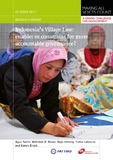Indonesia’s Village Law: enabler or constraint for more accountable governance?
Date
2017-10Author
Salim, Agus
Bulan, Wahidah R.
Untung, Bejo
Laksono, Indro
Brock, Karen
Metadata
Show full item recordImpact
Abstract
Village underdevelopment is considered a major contributor to Indonesia’s high levels of inequality. Law No.6 / 2014 (‘Village Law’) on villages’ governance and finance is regarded as the most progressive policy in the history of local governance in Indonesia, and has great potential for rural development.
This study investigates the implementation of the Village Law, asking whether it is functioning as an enabler or a constraint for more accountable governance. Indonesian non-governmental organisation PATTIRO carried out the study and visited six villages, which were selected as examples of good practice in governance. The study finds that, overall, the law both enables and constrains positive changes towards more accountable governance. It is an enabler in that its stipulations have generally encouraged some village reforms, compared with the previous law, and has helped to increase national and district funds going to villages. But the law also constrains village governments from optimising their development programmes in various ways, including by imposing a complex reporting burden. It fails to define roles and responsibilities clearly and accurately, perpetuating ambiguities that impede better functioning and accountability. Citizen participation within the framework of the law is also not optimum: first the law does not enable all village citizens to monitor village elections; second, there are restrictions on who can participate in village forums (Musdes); third, implementation of the law limits the authority of ‘the village’, subordinating it to district government for governance and finance. Based on these findings, PATTIRO offered recommendations for different government authorities for strengthening the Village Law’s implementation and has created research uptake spaces to share knowledge and practical experience of implementing the Village Law.
Citation
Salim, A.; Bulan, W.R.; Untung, B.; Laksono, I. and Brock, K. (2017) Indonesia’s Village Law: enabler or constraint for more accountable governance? Making All Voices Count Research Report, Brighton: IDSRights details
http://www.ids.ac.uk/files/dmfile/IDSOpenDocsStandardTermsOfUse.pdfhttp://creativecommons.org/licenses/by-nc-nd/2.0/uk/
Sponsor
DFIDUSAID
Sida
Omidyar Network
Collections
- Making All Voices Count [134]

